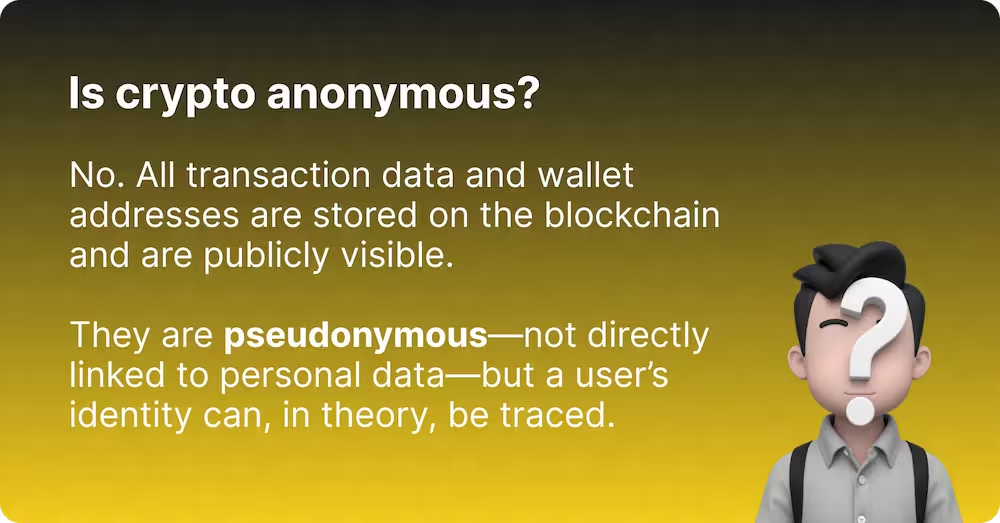Worried about tax mistakes?
From January 1, 2026, things get serious: your crypto exchange will automatically send your data to the tax authorities.
The reason is CARF—an OECD-coordinated reporting framework that applies in 52 countries. You don’t report; the service providers do: exchanges, brokers, wallet providers. The result: your crypto activity becomes visible to the state.
The “Wild West” era in crypto is over. If you don’t keep proper records now, you’ll be in a weak position when questions come in 2026/27. In this guide, we explain what CARF and DAC8 mean for you—and how to be perfectly prepared with Blockpit.
But aren’t cryptocurrencies anonymous?
Let’s take a step back. You might be wondering: aren’t cryptocurrencies anonymous—so how could the tax office possibly know about your crypto?
That’s a persistent myth. Is it true? No.
Crypto is actually very transparent: all transactions and wallet addresses are recorded on the blockchain and publicly visible. While they aren’t directly linked to personal data, with the right information they can, in theory, be traced back to an individual. Crypto is therefore pseudonymous, not anonymous.
<div fs-richtext-component="info-box" class="info-box"><div class="flex-info-card"><img src="https://assets-global.website-files.com/65098a145ece52db42b9c274/650c6f4cef4c34160eab4440_Info.svg" loading="lazy" width="64" height="64" alt="" class="icon-info-box"><div fs-richtext-component="info-box-text" class="info-box-content"><p class="color-neutral-800">Specifically: If you send Bitcoin to a friend, your names don’t appear anywhere. What is visible is that BTC moved from your address to their address. If someone knows which address is yours, they can track your activity.</p></div></div></div>

Does the tax office already have access to this data?
Yes and no. Not necessarily across the board yet—but the chances are rising fast.
Why? Start with the basics: crypto exchanges are required to verify your identity. That’s KYC (Know Your Customer) and happens during registration. You provide things like your passport, address, and other details.
Exchanges therefore hold your personal data and information about which cryptos you own and how you trade. But how does that reach the tax office?
Because regulation is catching up with what’s long been technically possible. Reporting and tax obligations are being expanded and increasingly enforced. The time when crypto was essentially the Wild West—“do what you want” with little regard for taxes—is over. In short: the state wants its share, and the tools for that (e.g., CARF/DAC8) are ready to go.
What do CARF and DAC8 actually do?
From January 1, 2026, the OECD’s Crypto Asset Reporting Framework (CARF) will be implemented in 52 countries, including the UK. The US will follow from 2027. CARF doesn’t target private individuals directly; it targets crypto service providers—exchanges, brokers, and wallet providers. From 2026 onward, they must report users’ crypto data to tax authorities across all participating countries.
And DAC8? It’s the EU implementation of CARF—substantively the same, just at the EU level.
Key point: Any provider licensed in one of these countries must report user data to the tax authorities. This also applies to platforms like Binance or Bybit that are based outside the EU (e.g., Hong Kong or the Cayman Islands) if they hold a license in a participating country such as Malta, Lithuania, or Germany.
Which data will be transmitted?
From January 1, 2026, crypto service providers must report, among other things:
- KYC data: name, address, date of birth, nationality, tax ID
- Transactions:
- crypto-to-crypto exchanges
- crypto-to-fiat trades (e.g., EUR)
- deposits and withdrawals (e.g., wallet transfers)
- Wallet information: for transfers you must indicate whether it’s your own (self-hosted) wallet or a third-party wallet.
Not yet mandatory: e.g., staking income—but this may change at the country level.
Will data be reported retroactively?
Generally, no: Under CARF and DAC8, only transactions from 2026 onward are reported.
However, tax authorities can issue collective information requests to crypto exchanges. In that case, exchanges may have to provide data from earlier years.
Example: Since May 2023, Bitcoin.de users who traded more than €50,000 per year between 2015 and 2017, are getting mail from tax authorities. This shows that crypto transactions can still be tax-relevant years later.
What happens to the data?
In February 2027, the first reported data will reach national tax authorities—including the United Kingdom. What happens next isn’t officially defined yet, but the following is very likely:
- Match with existing tax records: Anyone holding crypto but reporting nothing may be flagged.
- Internal “red flag”: Individuals with a reported crypto account will likely be marked and reviewed more closely if needed.
- Focus on top users: Those with high trading volumes or large deposits may hear from the tax office early.
<div fs-richtext-component="info-box" class="info-box warning"><div class="flex-info-card"><img src="https://assets-global.website-files.com/65098a145ece52db42b9c274/650c6f473e84badfdd6e059e_Care.svg" loading="lazy" width="64" height="64" alt="" class="icon-info-box"><div fs-richtext-component="info-box-text" class="info-box-content"><p class="color-neutral-800">CARF closes the data gaps: From 2026, crypto service providers will automatically report transactions to the authorities. Millions of records will be sent worldwide—at Binance alone, over 100 million accounts.</p></div></div></div>
What does this mean for you as a crypto user?
If you’re contacted by the tax office—e.g., by letter—and then do nothing, it can be treated as intentional tax evasion. The consequences range from fines to imprisonment, and “I didn’t know” no longer counts as an excuse. Until now, voluntary disclosure often led to leniency—from 2027, that may change.
Stay on the safe side with Blockpit
- Start documenting now: record your crypto transactions in full — including past years.
- Track correctly for tax: Blockpit imports your data (API/SSO/Public Key/CSV) and generates reports at the click of a button.
- Start for free: sign up with email only — no payment details or personal data required.
- Proactive, not panic: don’t wait for a letter from the tax office — start tracking now and be prepared.
